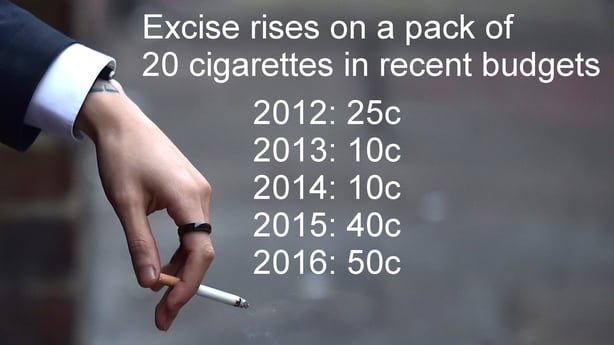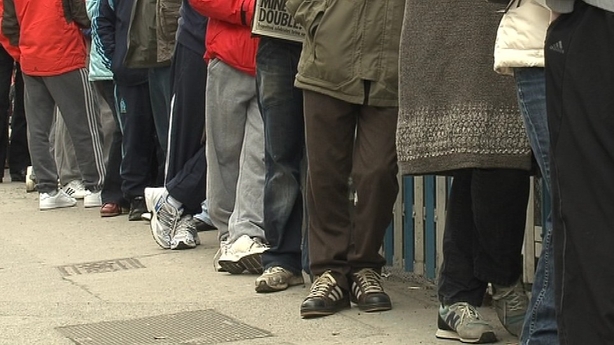Ahead of today's budget speeches, take a look back at some of the main tax and spending measures over recent budgets.
Budget 2016

Budget 2016 saw several changes to the Universal Social Charge.
The entry threshold rose from €12,012 to €13,000; the 1.5% rate was reduced to 1% for the first €12,012 of income, while the 3.5% rate fell to 3% for the next €6,656.
The top rate of 7% was reduced to 5.5% for income in excess of €18,668 up to €70,044.
Excise on a pack of 20 cigarettes increased by 50c, the latest in a series of rises.
The Early Childcare and Education scheme was extended, to children aged three up until they are five and a half, or until they begin primary school. Child benefit increased by €5 to €140 per month for every child and free GP care was extended to all children under 12 years of age.
Pensions were increased by €3 a week for recipients aged 66 and over, while the Christmas Bonus, Fuel Allowance, Respite Care Grant, and Carer Tax Credit were all increased.
The minimum wage increased from €8.65 to €9.15 per hour from 1 January 2016.
On the spending side, 2,260 additional teaching posts, including 600 new resource teachers, were announced, along with funding to recruit and train an additional 600 gardaí.
NAMA was tasked with delivering a target of 20,000 residential units before the end of 2020, with 90% of the units in the greater Dublin area.
Statutory paternity leave of two weeks was announced, taking effect in September 2016.
Budget 2015

Budget 2015 saw the news that Child Benefit would go up by €5 per child.
Water Charges Relief worth up to €100 was announced, while the entry point for USC was raised to above €12,000.
The government announced that the 'Double Irish' tax rule was to be phased out, while the 0.15% pension would expire at the end of 2015.
The price of 20 cigarettes rose by 40c, but there were no changes in alcohol excise duties.
A €2.2bn capital investment in social housing over three years was announced, along with plans for Local Authorities to house extra 3,000 households in 2015
The Government said recruitment into the Civil Service would resume.
The 9% VAT in the hospitality sector was again retained.
€13.1bn was allocated for health services in 2015.
Budget 2014

Budget 2014 saw Child Benefit for the fourth and subsequent child cut to €130 from January, from the previous rate of €140.
The 0.6% pension levy was increased to 0.75% and extended until the end of the year.
A review of all medical cards was announced, with the aim of saving €113m by removing ineligible and redundant cards.
Prescription charges for medical card holders were increased from €1.50 to €2.50
A new garda recruitment programme was announced, while over 1,250 classroom and resource teachers were also to be recruited.
There was no reduction in basic social welfare rates, but those aged 25 on Jobseeker’s Allowance would be on a rate of €144, while the €100 rate would apply to anyone aged 24 or under.
€200m from the sale of the National Lottery Licence was ring-fenced for the construction of the National Children's Hospital.
€30m was allocated to restart the State's house-building programme, and €10m was allocated for an unfinished housing estate resolution initiative and a further €10m was allocated to resolve problems at Priory Hall housing complex
Plans for NAMA to invest €2bn in the Irish commercial market were announced.
The Government said it expected to exit the bailout programme by 1 January, and to bring the deficit to 4.8%, ahead of required targets.
Excise duty on a 750ml bottle of wine rose 50c, beer and cider 10c, and 20 cigarettes 10c.
Budget 2014 also saw the announcement of free GP care for children under six.
Budget 2013
 Budget 2013 saw the introduction of the Local Property Tax, to begin in July 2013, with a rate of 0.18% on homes worth up to €1m, and 0.25% on those over €1m
Budget 2013 saw the introduction of the Local Property Tax, to begin in July 2013, with a rate of 0.18% on homes worth up to €1m, and 0.25% on those over €1m
The basic weekly rate of Social Welfare was untouched, but the duration of Jobseeker's Benefit was reduced by three months, from a year to nine months, and it was announced that Maternity Benefit would be taxed from 1 July.
Income Tax was untouched, but PRSI became payable on all sources of income, while the PRSI allowance for employees was abolished.
Child Benefit was cut by €10 a month for the first and second child, €18 for the third child and €20 for the fourth and subsequent children.
The prescription charge for Medical Card holders was trebled to €1.50.
Duty on 20 cigarettes went up by 10c, as did pints of beer/cider and standard measures of spirits.
A 750ml bottle of wine went up by €1.
Further increases in the third-level registration charge were announced, meaning it would rise by €750 by 2015, with a €250 rise in 2013, 2014 and 2015.
The closure of 100 garda stations was announced, along with a reduction in the opening hours of another seven.
Budget 2012

In Budget 2012, there were no changes to the main weekly social-welfare payments, but payments for new claimants of the Disability Allowance were cut to €100 a week for people aged 18-21, and to €144 for people aged 22-24.
A staff ceiling of 103,800 employees was introduced for the HSE, while there was a 2% cut in disability, mental health and children's services, saving €50m.
Higher education funding was cut by 2%, and the third-level student contribution was increased by €250
There was a €79m cut in spending for An Garda Síochána.
There was no increase in income tax and the USC exemption was raised to €10,000, affecting 330,000 people, but VAT was raised from 21% to 23%.
There was a 25c increase on a pack of 20 cigarettes, but there was no change in excise duty on alcohol.
Budget 2011

There was no reduction in the State Pension in Budget 2011, but Child Benefit rates were cut by €10, while there were €8 cuts for Jobseeker payments, the Disability Allowance, and carers under 66.
Petrol duties were raised by 4c per litre, while diesel rates were raised by 2c.
A revised air travel tax of €3 was announced, to be introduced the following March.
It was announced that public service pay would not be cut, but a €250k cap was introduced for pay in the public sector.
Public sector pensions over €12k were cut by 4%.
The next president would have their salary capped at €250k, while the Taoiseach’s salary was cut by €14k and ministers saw a €10k pay cut.
Income and health levies were replaced by the newly-introduced Universal Social Charge, with rates of 0% up to €4,004, 2% up to €10,036, 4% on income between €10,036 and €16,016, and 7% on income above that level.
The third-level student charge was raised by €500 to €2,000, while student grants were cut by 4%.
